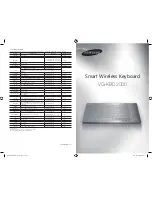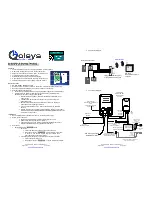
Startup
Startup—the Details
2-3
Digital
For
digital
audio
output
from
the
PC3K,
connect
a
75
‐
Ohm
coaxial
cable
from
the
PC3K’s
RCA
Digital
Out
jack
to
the
AES
or
S/PDIF
input
of
the
receiving
device.
You
may
need
an
RCA
‐
to
‐
XLR
adapter
to
connect
with
the
receiving
device.
If
the
receiving
device
receives
only
optical
signals,
you’ll
need
a
converter
as
well.
The
PC3K’s
Master
Page
(press
the
Master
mode
button)
lets
you
select
a
range
of
useful
sample
rates
for
the
digital
output.
The
RCA
jack
labeled
ʺ
Sync
In
ʺ
allows
you
to
synchronize
the
PC3K
ʹ
s
S/PDIF
Digital
Audio
output
sample
rate
to
an
external
S/PDIF
source.
Although
no
audio
signal
is
received
by
the
ʺ
Sync
In
ʺ
jack,
its
clock
is
received
and
may
be
used
to
set
the
output
sample
rate.
For
more,
please
see
Master
Mode
Page
1:
Digital
Output
on
page 11
‐
9.
NOTE:
Sync
In
is
NOT
a
ʺ
Word
Clock
ʺ
input.
Only
a
valid
S/PDIF
signal
is
recognized.
Connecting MIDI
The
simplest
MIDI
configuration
uses
a
single
5
‐
pin
MIDI
cable:
either
from
the
MIDI
Out
port
of
your
PC3K
to
the
MIDI
In
port
of
another
instrument,
or
from
the
MIDI
Out
port
of
another
MIDI
controller
to
the
MIDI
In
port
of
the
PC3K.
There
are
all
sorts
of
possible
configurations,
including
additional
synths,
personal
computers,
MIDI
effects
processors,
and
MIDI
patch
bays.
Depending
on
your
system,
you
may
want
to
use
the
PC3K’s
MIDI
Thru
port
to
pass
MIDI
information
from
a
MIDI
controller
to
the
PC3K
and
on
to
the
next
device
in
your
system.
You
can
also
connect
MIDI
devices
to
the
PC3K’s
MIDI
Out
port,
which
can
send
channelized
MIDI
information
from
the
keyboard
or
through
the
PC3K
from
your
MIDI
controller.
The
MIDI
Thru
port
can
be
configured
to
serve
as
an
additional
MIDI
Out
by
sliding
the
nearby
switch
to
the
Out
position.
You
can
also
use
the
PC3K’s
USB
port
to
send
and
receive
MIDI.
By
default
the
PC3K
will
show
up
as
a
USB
MIDI
device.
If
you
choose
USB
Temporary
Drive
from
Storage
mode,
the
PC3K
will
temporarily
(while
on
that
Storage
mode
page)
become
a
“virtual
storage
device”
and
USB
MIDI
will
be
disabled.
Different
host
programs
on
your
computer
may
indicate
various
errors
as
the
USB
MIDI
device
is
no
longer
present.
Leaving
Storage
mode
will
restore
USB
MIDI
functionality.
USB
MIDI
and
5
‐
pin
MIDI
can
be
used
at
the
same
time;
the
MIDI
signals
will
be
combined
into
a
single
16
‐
channel
MIDI
stream.
Summary of Contents for PC3K6
Page 24: ...1 6 Introduction Options...
Page 50: ...4 4 The Operating Modes Using the Modes...
Page 58: ...5 8 Editing Conventions Special Button Functions...
Page 130: ...6 72 Program Mode Programming Tips...
Page 202: ...7 72 Setup Mode Recording A Setup To Song Mode...
Page 206: ...8 4 Quick Access Mode The QA Editor...
Page 232: ...9 26 Effects Mono Algorithms...
Page 268: ...11 18 Master Mode Preview Sample PRVIEW...
Page 302: ...12 34 Song Mode and the Song Editor Song Editor The EVENT Page...
Page 328: ...14 14 Keymap and Sample Editing Editing Samples...
Page 334: ...B 4...
Page 370: ...D 32 PC3K Objects V 1 31 Effect Chains...
Page 372: ...E 2 PC3K Legacy File Conversion Object Types and Conversion Details...
















































